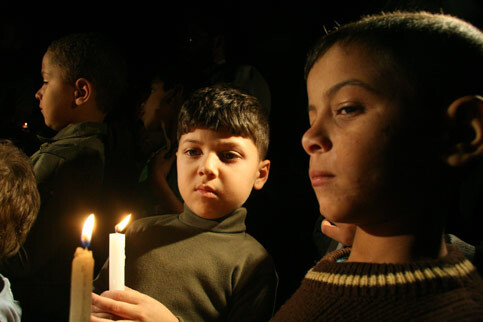Palestinian Center for Human Rights 12 November 2008

Palestinian children participate in a candle-lit demonstration after Gaza was plunged into darkness on 10 November 2008. (Hatem Omar/MaanImages)
The Palestinian Centre for Human Rights (PCHR) is deeply concerned over continued policies of collective punishment imposed by Israeli Occupation Forces (IOF) on the Palestinian civilian population in the Gaza Strip. These policies have included ban on delivery of food supplies and basic goods, including energy fuel required for electricity generation, grains and wheat. Following the halt of fuel supplies to the Gaza Strip in the past six days, more than 30 percent of the population of Gaza was in complete darkness last night, and people lined up in front of bakeries to buy flour and bread. Although IOF allowed the delivery of 427,410 liters of energy fuel this morning, which is enough to operate Gaza’s power plant for a single day, PCHR in concerned that humanitarian conditions in the Gaza Strip may further deteriorate.
IOF have closed all commercial crossings of the Gaza Strip since Wednesday, 15 November 2008, banning the delivery of the limited quantities of supplies that had been allowed into the Gaza Strip. IOF have also stopped the delivery of fuel supplies that had been already reduced, which has caused further deterioration to humanitarian conditions in the Gaza Strip that had been deteriorating since 15 June 2007 when IOF imposed a total siege on the Gaza Strip.
According to PCHR’s observations and its field workers’ report, the negative impacts of the last closure have been visible since Sunday, 9 November 2008. The closure of Nahal Oz crossing, which is used for the delivery of fuel supplies, has resulted in an acute shortage of the energy fuel required for the operation Gaza’ power plant that generates approximately one-third of the Gaza Strip’s daily needs of electricity. Engineer Hassan al-Nabih, Deputy Director General in the Palestinian Energy Authority, told PCHR that one of the electricity generation turbines in the power plant has been stopped due to the shortage of fuel supplies. As a result, the productivity of the plant had dropped from 70 to 50 megawatts. Al-Nabih added that the plant will be completely stopped if not replenished with fuel. He explained that the fuel supplied to the power plant, which is estimated at 2.5 million liters per week, is promptly consumed, and hence the plant has no reserves.
Yesterday, Monday, 10 November 2008, Gaza’s power plant was put off at 6:30pm when fuel ran out from the plant. As a result, many neighborhoods in the Gaza Strip, especially in Gaza City, where approximately 570,000 people live, were rendered in complete darkness. The Gaza Electricity Distribution Company has been forced to reschedule the distribution of electricity to various areas in the Gaza Strip to confront the electricity deficit resulted by the stoppage of operation of the power plant. The Gaza Strip depends on three main resources for its electricity supplies: Gaza’s power plant that provides 67-70 megawatts (34 percent of needs), Israel that sells to Gaza approximately 120 megawatts (58.5 percent of needs) and 17.5 megawatts which are imported from Egypt. This morning, IOF allowed the delivery of 427,410 liters of energy fuel that fulfill the plant’s needs for a single day, which means that the humanitarian crisis in the Gaza Strip will continue.
On another hand, the Gaza Strip suffers from acute shortages of most commodities, particularly flour and wheat, due to the continued closure of commercial crossings of the Gaza Strip. In addition, Gaza’s warehouses ran out of wheat; their daily needs of wheat and flour are estimated at 500 tons. Yesterday, Ziad al-Farra, Director-General of the Palestinian Mills Company in Khan Younis, stated that the company would stop its flour production within 24 hours due to the stopping of the delivery of its wheat supplies since Tuesday, 4 November 2008. Al-Farra added that the company used to get approximately 500 tons of wheat every day before IOF closed the crossing, and it has not received any quantities of wheat for six days. He explained they had approximately 600 tons of wheat in their warehouses, a quantity which is hardly enough for two days. He also said that there are concerns that the company may not be able to fulfill its contracted to supply 300 tons of flour to UNRWA, the UN agency for Palestine refugees, daily.
Sabri Abu Ghali, a wheat supplier, stated that during the last month, commercial crossings had been opened last month for wheat supplies for five days only, which deepened the wheat crisis and resulted in the consumption of limited quantities of wheat in the Gaza Strip’s warehouses. He confirmed that three out of the Gaza Strip’s mills have suspended their production of flour, and that the other two mills are expected to close by Wednesday if they are not supplied with wheat.
PCHR condemns the imposition of further restrictions, which constitute a form of collective punishment and acts of reprisal by IOF against the Palestinian civilians. The imposition of such restrictions forms is also a flagrant violation of the provisions of the international humanitarian law, including the Fourth Geneva Convention Relative to the Protection of Civilians in Times of War of 1949. PCHR calls upon the international community, especially the High Contracting Parties to the Fourth Geneva Convention, to break their silence, exert effective pressure on IOF to end the suffering of more than 1.5 million Palestinian civilians living in the Gaza Strip and ensure immediate and free flow of basic supplies, including fuel, food and medicine, into the Gaza Strip.
This press release was edited for clarity.
Related Links